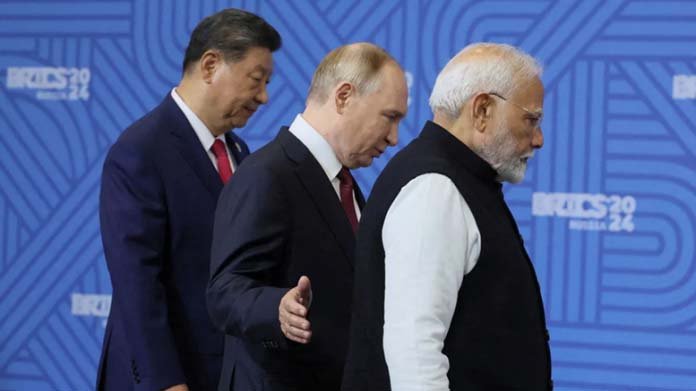The images from Tianjin spoke more than visuals. When Prime Minister Narendra Modi shared the podium with Xi Jinping and Vladimir Putin at the Shanghai Cooperation Organisation (SCO) summit, it was more than a mere photo-op. It reminded India of the reality of the moment that in a fragile world with all instruments of national power being weaponised, New Delhi must learn to mould every forum for furtherance of its national interest without falling into the pitfalls of great power rivalry.
The discussion on the restoration of the old Russia-India-China (RIC) format has re-emerged with a bounce. Moscow, battered by sanctions and increasingly dependent on Beijing, needs proof that it still counts beyond Europe. Beijing sees in RIC a stage where it can push an anti-Western optic and bind India into a continental frame. Yet anyone who has followed history knows why RIC stumbled in the first place. China’s dominance, Russia’s ambitions, and India’s hard border disputes with Beijing were never compatible. Those obstacles have not vanished, and no amount of nostalgia can turn the trio into a strategic triangle.
Prime Minister Narendra Modi shared the podium with Xi Jinping and Vladimir Putin at the SCO summit, it was more than a mere photo-op. It reminded India of the reality of the moment, that in a fragile world with all instruments of national power being weaponised, New Delhi must learn to mould every forum for furtherance of its national interest without falling into the pitfalls of great power rivalry
Still, it would be wrong to write off either RIC or the SCO. These gatherings matter less for their declarations and more for the space they create. The SCO in particular provides India a seat in Central Asia, a region it has long spoken about but rarely acted in. The agenda included counterterrorism, connectivity, energy and digital cooperation that matches Indian interests. Just as important, it allows India to talk to Russia and China at the same forum without being forced into a choice defined by Washington or Brussels.
That does not mean the forum is friendly ground or a hostile territory. Pakistan sits across the table, often propped up by Beijing to block or embarrass India. China also uses the SCO as a convenient vehicle to advance its Belt and Road (BRI) projects, something India has resisted on the grounds of sovereignty. The contradictions are seeped deeply in the institution. The task for India is to convert these contradictions into leverage, not allow them to dictate the agenda. Yet not adopt an ostrich-like approach of closing the doors of diplomacy and building trust for a shared future.
For too long, India has limited itself to presence. To count in Central Asia, it must show up with hard capital, technology and infrastructure. Energy pipelines, trade corridors, and digital platforms are the instruments that shift influence. China arrives at every summit with contracts and cash. India usually arrives with speeches. Unless that changes, India will remain a participant, not a driver.
The smarter play is to treat the Shanghai Cooperation Organisation (SCO) not as one bloc but as a space for selective engagement. India does not need everyone to agree. Smaller coalitions can deliver joint counterterrorism projects with Central Asian states, targeted connectivity pilots, and even energy swaps. Narrow, focused ventures often succeed, while sweeping declarations collapse under their own weight.
Sharing a seat at the SCO does not erase the lessons of Doklam, the scars of Galwan, or Beijing’s open support to Pakistan in sensitive operations. Nor does it soften the reality of Chinese road and infrastructure activity along the Line of Actual Control. No amount of summitry should blur that hard fact. Diplomacy must walk hand in hand with vigilance on the border
But presence and projects are not enough. Eurasia is a theatre of competition, not fraternity. Diplomacy in such a space has to be backed by credible power. Without visible defence readiness and logistics reach, India risks being boxed-in by larger players. Dialogue backed by deterrence is the only way to stay relevant in this crowded arena.
All this unfolds against a wider churn. The world is not simply beginning to slip out of American hegemony into clean multipolarity. What is taking shape, however, is a network of overlapping partnerships, trade groupings in one place, digital alliances in another, defence alliances somewhere in between and diversification to minimise dependency or external leverage. It is not a chessboard but a tangled web, sometimes referred to as heterolayer partnerships. For India, the disorder carries risk, but it also creates openings if used with agility.
Strategic autonomy in such a world cannot resemble the old non-alignment of standing aloof. Nor can it mean sitting exactly in the middle of every contradiction. It must be better positioned: it must be joined where national interest dictates, it must be hedged where risks are great, and it has to be resilient against pressure. In the SCO that would translate to cooperating where the benefits are measurable, opposing where sovereignty is at stake and trading where it would reduce vulnerability.
This transparency is needed more when handling China. Sharing a seat at the SCO does not erase the lessons of Doklam, the scars of Galwan, or Beijing’s open support to Pakistan in sensitive operations. Nor does it soften the reality of Chinese road and infrastructure activity along the Line of Actual Control. No amount of summitry should blur that hard fact. Diplomacy must walk hand in hand with vigilance on the border.
Russia remains a different but equally complex puzzle. Its tilt towards China is obvious, but Moscow still values Delhi as a partner that does not parrot Western talking points. That gives India space to work in energy, defence production and even space cooperation. But dependence is a trap. Bargains with Moscow cannot come at the expense of long-term freedom of choice. Balancing Russian ties with diversification through Western and home-grown capacity is the only way forward.
The Tianjin summit exposed both the promise and the limits of Eurasian multilateralism. The way ahead for India is clear. Use the SCO to anchor presence in Central Asia. Work with Russia but avoid becoming dependent. Talk to China without conceding on terms. Build selective partnerships inside broader forums. And most of all, treat diplomacy not as theatre but as an extension of domestic strength
The Tianjin summit also threw the spotlight back on Delhi’s own economic and industrial base. Influence abroad is only as strong as capability at home. If India wants to matter in Eurasia, it needs reforms that make it more competitive, an industrial base that can deliver scale, and financial instruments that allow it to back ideas with money. China wins influence not just through diplomacy but by bringing the chequebook. India must learn to do the same.
The reality is that global geopolitics is growing messier, more so with President Trump’s ideocracy. The West is fragmenting, China is increasingly assertive yet has many internal faultlines, Russia is under global pressure but still strong and determined, and middle powers from Turkey to Brazil are busy carving their own space. In this flux, India’s role is not to pledge allegiance to any bloc but to build leverage in all directions. Forums like SCO, RIC, BRICS, the G20 or the Quad are not homes to belong to but instruments to be used.
The Tianjin summit exposed both the promise and the limits of Eurasian multilateralism. The way ahead for India is clear. Use the SCO to anchor presence in Central Asia. Work with Russia but avoid becoming dependent. Talk to China without conceding on terms. Build selective partnerships inside broader forums. And most of all, treat diplomacy not as theatre but as an extension of domestic strength.
RIC may return as a headline, but it will never be a coherent bloc. India’s real test is to turn churn into opportunity, forums into levers, and fractured multipolarity into a strategic edge. That is what strategic autonomy must mean today: clarity of interest, agility of engagement, and the strength to shape outcomes rather than be shaped by them.
The author, a PVSM, AVSM, VSM has had an illustrious career spanning nearly four decades. A distinguished Armoured Corps officer, he has served in various prestigious staff and command appointments including Commander Independent Armoured Brigade, ADG PP, GOC Armoured Division and GOC Strike 1. The officer retired as DG Mechanised Forces in December 2017 during which he was the architect to initiate process for reintroduction of Light Tank and Chairman on the study on C5ISR for Indian Army. Subsequently he was Consultant MoD/OFB from 2018 to 2020. He is also a reputed defence analyst, a motivational speaker and prolific writer on matters of military, defence technology and national security. The views expressed are personal and do not necessarily carry the views of Raksha Anirveda






